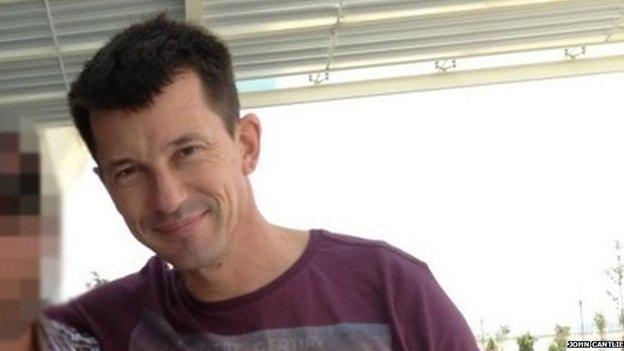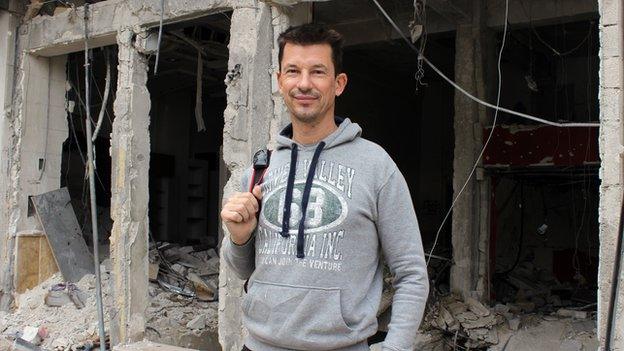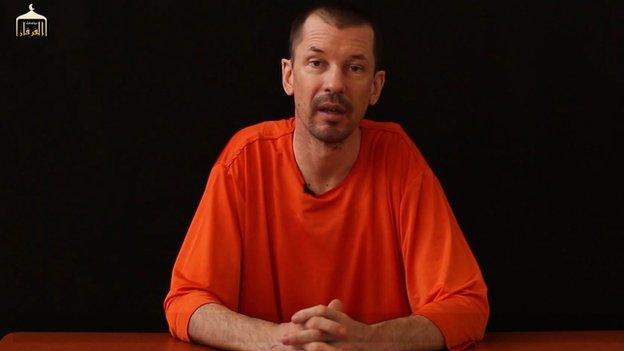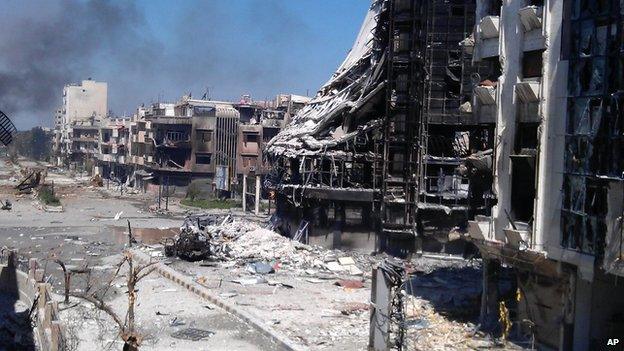Profile of British captive John Cantlie
- Published

John Cantlie has suffered the terrible misfortune of being kidnapped not once - but twice.
The first time he was lucky to escape with his life.
After the second occasion he was unheard of in public until the release of a hostage video from self-styled Islamic State (IS) fighters.
He has now appeared in a string of such videos, addressing the camera directly, the most recent of which was shot in the war-torn Syrian town of Kobane.
Experienced journalist
Mr Cantlie cannot be described either as inexperienced or as someone who did not know what he was doing in a dangerous environment.
For 20 years he has specialised in writing and filming news features that others would rather not do. His portfolio is stacked full of highly readable adventure features, ranging from extreme sports, to off-road motorcycling.
But aside from the fun stuff, Mr Cantlie is a very experienced journalist who has reported from some of the most dangerous places in the world - Iraq, Afghanistan, Libya and Somalia.
In 2003, during the US-led invasion of Iraq, he travelled as a freelance journalist into the country.
Reporters who have worked with Mr Cantlie in the past described him as a good-humoured man who gets the job done in difficult conditions.
His work has appeared in national and international titles, including the Sunday Times, the Sunday Telegraph, Esquire, GQ and Top Gear.
His first kidnapping in Syria occurred in July 2012.

John Cantlie has been kidnapped in Syria twice

Mr Cantlie as he appeared in an online video released by IS militants
He had already reported on the war zone in the country, writing an eyewitness account for the Sunday Telegraph, external of tanks rolling into a rebel stronghold.
Later that year he returned to Syria, crossing the Turkish border at night with a Dutch journalist and a Syrian guide.
Less than two miles inside the country the three men came across a camp they thought was the Free Syrian Army. It wasn't.
The men weren't Syrians but jihadists who had travelled to the country hoping to overthrow the regime and establish an Islamist state.
'Imagination can run riot'
Some of them spoke English with British accents. About nine of the men in the camp had London accents - and two could not speak any Arabic.
One of the men who had come from the UK accused the journalists of being spies - but Mr Cantlie later said there was another British man, a trained doctor, who treated the captives humanely.
On the second day, the men tried to escape, running off from the camp in the twilight.
However, they were spotted by their captives, some of whom opened fire. The Dutch journalist was shot through the hip and Mr Cantlie through the arm.

Mr Cantlie has reported from a number of warzones, including from Syria in 2012
Days later, amid genuine fears they were going to be killed by the gang, the men were rescued by members of the Free Syrian Army who had heard what had happened.
Speaking to BBC Radio 4 after his return, Mr Cantlie recalled fearing for his life as they were held by the men from the UK.
"It's funny looking back on it now when you are sat in a comfortable studio and familiar surroundings and people around you," he said.
"But when you are held captive, you have a blindfold on and a guy sticking a gun in your head, it is very real. It was inferred that we would meet our God, were we ready to meet God, that we had sown the seeds of our own destruction.
"The imagination can run riot. These are not nice thoughts... and I had them."
Family appeals
In November 2012, Mr Cantlie decided to go back to Syria to continue his reporting from the warzone - and some of his photographs from that trip featured in a Sunday Telegraph article, external.
They showed a Syrian Air Force jet bombing the town of Maraat al-Numan. Another showed buildings that had been completely wrecked in the fighting.
It was during this visit to Syria that the second kidnap occurred.
Nothing was publicly heard of Mr Cantlie after that date until IS militants released the first video of him in September.
There are no signs of violence in the apparently scripted videos but, in the first, Mr Cantlie made it clear he was speaking as a prisoner whose life was in danger.
His father Paul Cantlie made a heart-rending appeal for John's return - but sadly died in October.
In a video message direct to the militants holding his son, he said the footage of John in the IS video was the first he had seen of him for two years.
"I want John to know how very proud I am of him," Paul Cantlie said, speaking from his hospital bed. "I can think of no greater joy than seeing my dear son released and allowed to return home to us."
Since then, his sister Jessica has also called for "direct contact" with the militants holding him.